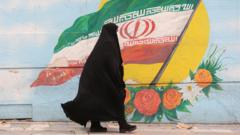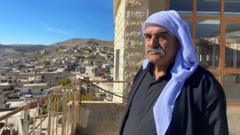The U.S. State Department is examining reports of the detention of Iranian-American journalist Reza Valizadeh in Iran, coinciding with heightened hostilities between Iran and the United States, amid a politically charged backdrop.
U.S. State Department Investigates Arrest of Iranian-American Journalist in Iran

U.S. State Department Investigates Arrest of Iranian-American Journalist in Iran
As tensions escalate between the U.S. and Iran, reports emerge of the arrest of Reza Valizadeh, sparking international concern.
In the context of burgeoning tensions between Iran and the United States, the State Department is scrutinizing allegations regarding the arrest of an Iranian-American citizen. Rights organizations state that Reza Valizadeh, who is an Iranian-American journalist, was apprehended in Iran and currently held at Evin Prison, one of the country’s most infamous detention facilities.
On November 3, 2024, a State Department spokesperson confirmed the investigation into claims of a dual U.S.-Iranian citizen’s arrest but did not explicitly identify Valizadeh as the detained individual. This announcement coincides with remarks from Iranian officials intensifying threats toward Israel and the United States. Supreme Leader Ayatollah Ali Khamenei warned of a potential “crushing response” to recent Israeli airstrikes targeting Iranian air-defense systems, which added tension to the situation.
The reports surfaced against the historical context of the 45th anniversary of the U.S. embassy hostage crisis, where over 50 Americans were held by Iranian militants for 444 days, eliciting widespread condemnation and long-lasting effects on U.S.-Iran relations. The significance of these memories looms large while both nations grapple with complex geopolitical landscapes.
Valizadeh, who previously worked at Radio Farda—part of the U.S.-funded entity Radio Free Europe/Radio Liberty—had reportedly been arrested around September. Rights groups claim he is being held without access to legal representation. Valizadeh’s arrest raises serious concerns regarding the safety of foreign nationals and activists in Iran, exacerbating fears that such detentions could be used as leverage in ongoing diplomatic standoffs.
The situation draws attention not only to U.S.-Iran relations but also highlights the fragile state of press freedom and human rights within Iran, where journalists and dissenting voices face significant risks.
As the United States persists in its diplomatic inquiry, implications of Valizadeh's arrest may influence future negotiations and international perceptions of Iran's human rights record.
On November 3, 2024, a State Department spokesperson confirmed the investigation into claims of a dual U.S.-Iranian citizen’s arrest but did not explicitly identify Valizadeh as the detained individual. This announcement coincides with remarks from Iranian officials intensifying threats toward Israel and the United States. Supreme Leader Ayatollah Ali Khamenei warned of a potential “crushing response” to recent Israeli airstrikes targeting Iranian air-defense systems, which added tension to the situation.
The reports surfaced against the historical context of the 45th anniversary of the U.S. embassy hostage crisis, where over 50 Americans were held by Iranian militants for 444 days, eliciting widespread condemnation and long-lasting effects on U.S.-Iran relations. The significance of these memories looms large while both nations grapple with complex geopolitical landscapes.
Valizadeh, who previously worked at Radio Farda—part of the U.S.-funded entity Radio Free Europe/Radio Liberty—had reportedly been arrested around September. Rights groups claim he is being held without access to legal representation. Valizadeh’s arrest raises serious concerns regarding the safety of foreign nationals and activists in Iran, exacerbating fears that such detentions could be used as leverage in ongoing diplomatic standoffs.
The situation draws attention not only to U.S.-Iran relations but also highlights the fragile state of press freedom and human rights within Iran, where journalists and dissenting voices face significant risks.
As the United States persists in its diplomatic inquiry, implications of Valizadeh's arrest may influence future negotiations and international perceptions of Iran's human rights record.





















